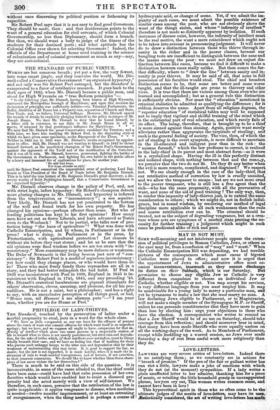PRIVILEGE OF LADY-THIEVES.
THE Standard, touched by the persecution of ladies under a morbid propensity to steal, puts in a word for the whole class. "We have as little compassion as any can have for the offences of persons above the reach of want who commit offences for which want itself is an imperfect apology; but we have, and we suppose all ought to have, compassion for that in- firmity of intellect which alone can cause persons in a respectable station of life to hazard what to them is not merely punishment, hut utter ruin and degrada- tion, for the sake of trifles which, if their intellects were not infirm, must be things wholly beneath their care; and we have no feeling but that of loathing for those who 'pursue such unhappy beings to the utter rum and degradation that by their weakness of understanding they may incur. It is good to support the law, no doubt; but the law is not supported, it is made hateful, when it is made the in strament of ruin to weak-minded transgressors, and of torture, if not extortion, to their innocent connexions. We should like to know whether these fierce cham- pions of law never violate the law themselves?"
There is much to be said on this side of the question. It is inconceivable, in some of the cases alluded to, that the thief could have been sane—could have had that calm possession of her own faculties which would have enabled her to resist a diseased pro- penalty had she acted merely with a view of self-interest. We therefore, in such cases, perceive that the retribution of the law is quite inapplicable: it applies vengeance to disease, when medicine is needed—twelve months' imprisonment, or at least an estreating of recognixances, when the thing needed is perhaps a course of
hydrocyanic acid, or change of scene. , Yet, if we admit the im- punity of such cases, we must admit the possible existence of similar cases among the poor, who are not obviously above the want of the things stolen and whose "infirmity of intellect* therefore is not made so dislinctly apparent by isolation. If such instances of disease exist, however, the infirmity of intellect must be the real motive, the want a mere coincidence which ought not to be taken into account in pronouncing judgment. It will never do to draw a distinction between those who thieve through in- sanity in the richer and in the poorer classes, because our bungling tests are insufficient to distinguish between the sane and the insane among the poor : we must not draw an unjust dis- tinction between like cases, because we find it difficult to make a distinction between cases really unlike. But then comes the fur- ther difficulty, where to "draw the line" between sanity and in- sanity in poor thieves. It may be said of all, that none in full possession of his faculties would steal. The chief and broadest distinction seems to be, that some are better and some worse taught, and that the ill-taught are prone to thievery and other vices. It is true that there are vicious among those even who are learned and accomplished ; but as a general rule this distinction is sufficiently obvious. Nor must the "education" mentioned in criminal statistics be admitted as qualifying the difference ; for it seldom deserves the name. Apart from all religious dogmas, the "superior education" of statistical tables may well be supposed not to imply that vigilant and skilful training of the Mind which is the substantial part of real education, and which rarely fails of its effect. The being, therefore, that is brought up to be a thief is more sinned against than sinning. Again' positive want surely alleviates rather than aggravates the turpitude of stealing; and such is the general feeling of society. The vice, then, of which the act of stealing is the overt symptom, is more difficult to ascertain in the ill-educated and indigent poor than in the rich; the "animus furandi," which the law professes to correct, is realized in the lady-thief in its purest and most abstract form—as it were in a crystalized shape. Having the ill in this perfectly distinct and isolated shape, with nothing between that and the reme,,y, we perceive that the two do not fit. Do they fit any better when the evil is more remote, complicated, and disguised! We suspect not. We see clearly enough in the case of the lady-thief, that our retributive method of correction by law is cruelly unsuited, and we allow the trespasser to escape : but are we not more cruel to the poorer trespasser, who is still less a free agent than the rich—who has the same propensity, with all the provocative of want, and none of the aid of good training? The only way, then, to render this impunity of lady-thieves jest, is to extend the same consideration to others; which we might do, not in foolish indul- gence, but in sound wisdom, by rendering our method of legal discipline more applicable to all such weaknesses than the rude and coarse retribution ever can be. The criminal should be treated, not as the subject of degrading vengeance, but as a crea- ture whose acts are symptoms of a morbid state proving the ne- cessity for further training; a judgment which might in such cases be predicated alike of rich and poor.


























 Previous page
Previous page